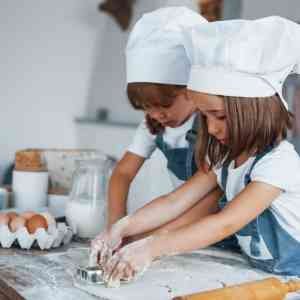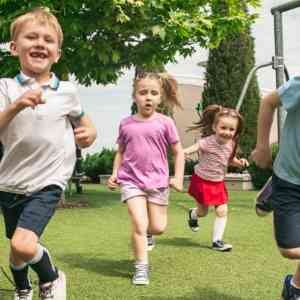In the context of childhood development, play emerges as more than just leisure. It is indispensable in nurturing a child’s cognitive and mental faculties. Beyond entertainment pursuits, play fosters intellectual development, emotional resilience, and social skills. At Edu21, we recognize the transformative power of play and have integrated various playful activities into our curriculum to ensure holistic development for our young learners.The blog will discuss the detrimental effects of less play activities on the mental health of children across the globe and some core factors that can be attributed to the decline in playtime. You will also discover the wonders of how playful activities can boost a child’s mental muscle, the diverse benefits they provide, and practical engagements that can turn learning into a delightful journey.
Decline in Play and Potential Repercussions
Imagine a world where playtime is replaced by endless hours of screen time and structured activities. Sounds a bit dull, right? Unfortunately, that’s becoming a reality for many children today, and it’s taking a toll on their mental health. When children don’t get enough playtime, they miss out on crucial opportunities to let their imaginations run wild, blow off steam, and just be kids. This lack of unstructured fun can lead to increased levels of stress, anxiety, and even depression. Play acts like a secret ingredient for emotional resilience and stress management. Without it, they are left feeling more overwhelmed and less able to handle life’s little ups and downs.
But that’s not all! Play isn’t just about having fun. It is also a social workshop where children learn to share, cooperate, and resolve conflicts. When playtime is reduced, kids lose valuable chances to develop their social capacities. This can result in feelings of isolation and difficulty forming friendships. Additionally, playtime is when creativity and problem-solving skills thrive. Without it, children might struggle to think outside the box or come up with creative solutions to problems. So, while less play might seem like a minor issue, it can have significant negative consequences for kids’ mental health and overall development.
Reasons Behind the Decline in Play Activities
The decline in children’s playtime can be largely attributed to the pervasive use of gadgets and social media. With the increasing availability of smartphones, tablets, and digital entertainment, children are spending more time indoors, absorbed in screen-based activities. This shift towards digital engagement often replaces physical and imaginative play. Additionally, social media platforms create an addictive environment that further detracts from outdoor playtime. The pressure of academic achievement and a packed schedule of structured extracurricular activities leave little room for unstructured play. Moreover, parental concerns about safety in outdoor environments further limit opportunities for free play, leading to a more sedentary lifestyle that negatively impacts both the physical and mental health of children.
Benefits of Playtime
Play is a powerful educational tool that stimulates various aspects of cognitive development. Children learn to solve problems, make decisions, and think creatively through play. Activities such as puzzles and building blocks challenge their problem-solving abilities and enhance spatial awareness. Pretend play, like playing house or telling stories, helps develop language skills and narrative thinking. Games that involve rules, like board games, teach children about structure, strategy, and the consequences of their actions.
Engaging in play also strengthens emotional intelligence. Children learn to navigate their emotions, build empathy, and understand the perspectives of others. Role-playing games allow them to experiment with different social roles and scenarios, helping them manage feelings like frustration, disappointment, and joy in a safe environment. Social play, such as playing with peers, teaches vital skills like sharing, cooperation, and negotiation. These interactions lay the foundation for healthy relationships throughout life.
Physical play, including running, jumping, and climbing, is equally essential. It not only improves physical health but also enhances brain function. Movement-based play encourages the development of motor skills and coordination. Games that involve following directions or remembering sequences, strengthen memory and attention span. Active play releases endorphins, reducing stress and increasing overall happiness, positively impacting cognitive functions.
Sensory play is critical for young children as it helps them make sense of the world around them. Children can explore and understand different textures, smells and sounds by engaging their senses. This form of play supports cognitive growth, language development, and fine motor skills.
Fine motor skills involve the coordination of small muscles, particularly in the hands and fingers, to perform tasks such as writing, cutting, and buttoning clothes. Developing these skills is crucial for young children as they form the basis of many everyday activities. Playful activities that involve manipulating small objects can significantly enhance these skills.
Some Fun Play Activities for a Healthy Mind
Let’s explore the exciting activities we incorporate at different levels. At the preschool level, using bubbles is one of our favorite activities to boost cognitive development. Making bubbles with straws might seem simple, but it involves understanding the properties of air and liquid, foundational concepts in science. Children delight in blowing bubbles, but beneath the fun lies a lesson in cause and effect as they discover how their breath transforms liquid into airy spheres. This hands-on experience fosters experimentation and sparks their curiosity about the world around them.
A fun activity we include to boost social and emotional growth involves utilizing a magic box brimming with intriguing objects. Children are encouraged to search the box and describe their feelings without looking. This activity is designed to enhance their sensory perception and descriptive language skills. Moreover, it promotes patience, turn-taking, and listening to others, which are vital social skills. As they discuss their findings with peers, they learn to articulate their thoughts and listen to different perspectives, fostering empathy and communication skills.
Another activity that fosters emotional and social development is the sensory guessing game. In this game, children rely on their sense of smell to identify various scents and determine whether they are pleasant or unpleasant. This activity enhances their olfactory awareness and encourages critical thinking and verbal communication as they express their opinions and reasoning behind their guesses. By engaging in this activity, children learn to trust their senses and develop confidence in interpreting and communicating their experiences.
One of our most popular activities is the clip counting exercise, a simple yet impactful task where children count and hang clips on cups. This activity is designed to enhance fine motor skills and numeracy in a playful manner. Moreover, the repetitive nature of clipping and unclipping helps strengthen the muscles necessary for writing and other delicate motor tasks.
At other levels, a range of enjoyable, playful exercises are included. Chess, often considered the “game of kings,” is a strategic and intellectually stimulating activity. By introducing children to chess, we aim to cultivate critical thinking, problem-solving, and decision-making skills from a young age. Through gameplay, children learn to plan, anticipate their opponent’s moves, and adapt their strategies. That is a valuable skill set applicable to various life aspects. Additionally, chess fosters patience, concentration, and sportsmanship as children navigate the challenges and victories of each match.
Skating, on the other hand, offers a dynamic blend of physical activity and artistic expression. As children glide, they develop balance, coordination, and agility-essential components of gross motor skill development. Skating encourages perseverance and resilience as children learn to overcome falls and setbacks while mastering new techniques. Beyond the physical benefits, skating promotes creativity and self-expression as children explore different movements and routines.
Role-play games are an excellent way for children to learn about community roles and the importance of different professions in society. Through imaginative play, children can explore various roles, understand their responsibilities, and appreciate how everyone contributes to the community’s well-being. One of the role-play activities we use is setting up a “community helpers” station. Children can take on the roles of firefighters, police officers, doctors, teachers, and other community helpers. They engage in scenarios where they perform tasks associated with these roles, such as putting out a pretend fire, helping a “patient” in need, or teaching a lesson to their peers. This activity helps children understand the importance of these professions and develop a sense of respect and gratitude for the people who perform them.

Incorporating environmental and sustainability lessons into activities is another way to enhance children’s learning. Teaching young children about recycling and environmental conservation through play can instill a sense of responsibility and care for the planet from an early age. We use recycled bottle caps to teach children about different types of recyclable trash. Children play sorting games where they categorize bottle caps by color, size, or type of material. This activity teaches them about recycling and enhances their sorting and classification skills, which are fundamental aspects of logical thinking. By making the activity playful and interactive, we ensure that children understand the importance of recycling in a fun and memorable way.
We believe play is not just a break from learning but it is the essence of learning itself. By integrating playful activities into our curriculum, we create an environment where children are excited to learn and explore. These activities make learning enjoyable and ensure that children develop the cognitive, emotional, and social skills they need to succeed in life.
The power of play lies in its ability to transform abstract concepts into tangible experiences. Children engaged in play are more likely to retain information and develop a deeper understanding of the world around them. Play encourages children to think creatively, solve problems, and interact with others in meaningful ways. It lays the foundation for lifelong learning and curiosity, ensuring children grow into well-rounded, intelligent, and emotionally healthy individuals.












